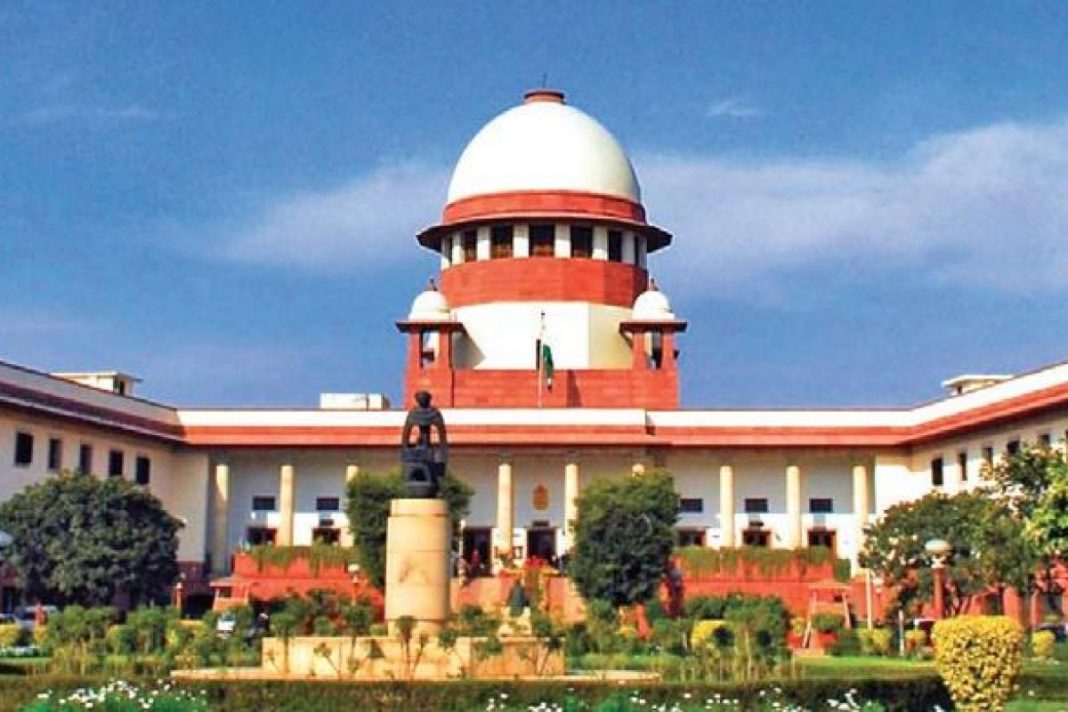ILNS: The Supreme Court on Tuesday set aside the bail given to six persons involved in the heinous crime of five homicidal deaths, saying that the order of the Gujarat High Court in granting bail to the accused on parity suffers from a clear perversity.
The Division Bench of Justice D.Y. Chandrachud and Justice M.R. Shah set aside the Gujarat High Court order, wherein the six persons were granted bail on the grounds of parity. They were implicated in five homicidal deaths and subsequently charged for murder and various other Sections of IPC, the Arms Act and Section 135 of the Gujarat Police Act.
The Supreme Court came down heavily on the abrupt observations and ‘perverse’ order of the Gujarat High Court, while releasing the six accused persons in utmost haste, by overlooking the nature and gravity of the crime.
“The High Court has evidently misconceived the central aspect of what is meant by parity. Parity while granting bail must focus upon role of the accused. Merely observing that another accused, who was granted bail, was armed with a similar weapon is not sufficient to determine whether a case for the grant of bail on the basis of parity has been established. In deciding the aspect of parity, the role attached to the accused, their position in relation to the incident and to the victims is of utmost importance,”
-said the apex court.
The Apex Court emphasized upon the priority to be accorded to the nature of crime as a pre-requisite before granting bail to an accused as laid down in Ram Govind Upadhyay v. Sudharshan Singh (2002) 3 SCC 598, it sets out following factors to be kept in mind before granting bail for heinous crimes i.e.
“While granting bail, the court has to keep in mind not only the nature of the accusations, but the severity of the punishment, if the accusation entails a conviction and the nature of evidence in support of the accusations.
Reasonable apprehensions of the witnesses being tampered with or the apprehension of there being a threat for the complainant should also weigh with the court in the matter of grant of bail.
While it is not expected to have the entire evidence establishing the guilt of the accused beyond reasonable doubt, but there ought always to be a prima facie satisfaction of the court in support of the charge.
Frivolity in prosecution should always be considered and it is only the element of genuineness that shall have to be considered in the matter of grant of bail, and in the event of there being some doubt as to the genuineness of the prosecution, in the normal course of events, the accused is entitled to an order of bail,” it added.
Also Read: Covid-19: Bombay HC notice to Centre, state on PIL saying only high and mighty get treatment
The case pertains to an FIR lodged on May 9, 2020 at the Aadesar, District East Kachchh, Gandhidham Police Station, for commission of offences charged under various Sections of IPC, including criminal conspiracy, murder, unlawful assembly, intimidation; Sections 25, 27 and 29 of the Arms Act and Section 135 of the Gujarat Police Act.
It is alleged that there was a land dispute that led to the death of five persons. The complainant said that he, along with his deceased brother Pethabhai, left for their farm at around 0600 hrs. At 1300 hrs, the complainant, Pethabhai and his brother-in-law Akhabhai were returning home in a vehicle with five other persons.
When their vehicle reached the untarred road passing through the farm of Lakha Hira Koli and Kanji Bijal Koli, the two persons came out along with Lakha Hira Koli. Lakha dashed his tractor on the front portion of their vehicle. Kanji parked his tractor on the rear side of their car, behind which another Sumo came to be stationed.
The accused indulged in the death of five persons, namely Vishan Heera Koli, Pravin Heera Koli, Sidhdhrajsinh Bhagubha Vaghela, Kheta Parbat Koli, Vanraj Karshan Koli and Dinesh Karshan Akhiyani (Koli). They were attacked by lathis, sticks, dhariyas and rifles. Panchnama was carried out on on May 10, 2020, resulting in the recovery of wooden sticks, two illegal guns, two country made guns, and four dhariya.
In Neeru Yadav vs State of UP (2014) 6SCC 508, the apex court held that while applying the principle of parity, the high court cannot exercise its powers in a capricious manner and has to consider the totality of circumstances before granting bail.
The apex court also noted the loophole in the high court judgment in which the single judge of the Gujarat High Court overlooked the criminal antecedents of appellant 13 (Sidhdhrajsingh Vaghela) against whom 2 FIRs had already been lodged and this facet was overlooked by the high court while considering bail.
Lastly, but not the least, the apex court cited numerous judgments, such as Sanjay Chandra V.CBI (2012)1 SCC 40 and Prabhakar Diwakar v St. of U.P. (2020) 11 SCC 648 focusing on the following factors, while adjudicating the bail petition. These were on the facts of the case, nature of allegations, gravity of offences, role attributed to the accused etc.
The Supreme Court criticised the order, saying that there was a callous approach in granting bail to six accused persons in such heinous crimes, and held
“the grant of bail by the High Court can be set aside, consistent with the precedents we have discussed above, when such grant is based on non-application of mind or is innocent of the relevant factors for such grant”.
Also Read: Vikas Dubey encounter: Supreme Court committee finds no evidence against Uttar Pradesh Police


